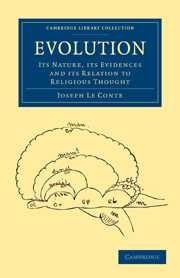Book contents
- Frontmatter
- PREFACE TO THE SECOND EDITION
- PREFACE TO THE FIRST EDITION
- Contents
- PART I WHAT IS EVOLUTION?
- PART II EVIDENCES OF THE TRUTH OF EVOLUTION
- PART III THE RELATION OF EVOLUTION TO RELIGIOUS THOUGHT
- CHAPTER I INTRODUCTORY
- CHAPTER II THE RELATION OF EVOLUTION TO MATERIALISM
- CHAPTER III THE RELATION OF GOD TO NATURE
- CHAPTER IV THE RELATION OF MAN TO NATURE
- CHAPTER V THE RELATION OF GOD TO MAN
- CHAPTER VI THE OBJECTION THAT THE ABOVE VIEW IMPLIES PANTHEISM, ANSWERED
- CHAPTER VII SOME LOGICAL CONSEQUENCES OF THE DOCTRINE OF THE DIVINE IMMANENCY
- CHAPTER VIII RELATION OF EVOLUTION TO THE IDEA OF THE CHRIST
- CHAPTER IX THE RELATION OF EVOLUTION TO THE PROBLEM OF EVIL
- Index
CHAPTER VII - SOME LOGICAL CONSEQUENCES OF THE DOCTRINE OF THE DIVINE IMMANENCY
Published online by Cambridge University Press: 29 August 2010
- Frontmatter
- PREFACE TO THE SECOND EDITION
- PREFACE TO THE FIRST EDITION
- Contents
- PART I WHAT IS EVOLUTION?
- PART II EVIDENCES OF THE TRUTH OF EVOLUTION
- PART III THE RELATION OF EVOLUTION TO RELIGIOUS THOUGHT
- CHAPTER I INTRODUCTORY
- CHAPTER II THE RELATION OF EVOLUTION TO MATERIALISM
- CHAPTER III THE RELATION OF GOD TO NATURE
- CHAPTER IV THE RELATION OF MAN TO NATURE
- CHAPTER V THE RELATION OF GOD TO MAN
- CHAPTER VI THE OBJECTION THAT THE ABOVE VIEW IMPLIES PANTHEISM, ANSWERED
- CHAPTER VII SOME LOGICAL CONSEQUENCES OF THE DOCTRINE OF THE DIVINE IMMANENCY
- CHAPTER VIII RELATION OF EVOLUTION TO THE IDEA OF THE CHRIST
- CHAPTER IX THE RELATION OF EVOLUTION TO THE PROBLEM OF EVIL
- Index
Summary
The doctrine of the Divine immanency carries with it the solution of many vexed questions. In fact, in its light these questions simply pass out of view as no longer having any significance. Several of these questions have been alluded to in an indirect way in the previous chapter and in Chapter III. We take them up distinctly here, and show their relation to evolution.
Religious thought, like all else, is subject to a law of evolution, and therefore passes through regular stages. Of these stages, three are very distinct and even strongly contrasted. They correspond in a general way to the three stages of Comte, which he has misnamed the theological, the metaphysical, and the positive. We will illustrate by many examples.
Conception of God
This, the most fundamental conception of all religion, has passed from a gross anthropomorphism to a true spiritual theism, and the change is largely due to science and especially to the theory of evolution. There are three main stages in the history of this change: (1.) The first is a low anthropomorphism. God is altogether such a one as ourselves, but larger and stronger. His action on Nature, like our own, is direct; his will is wholly man-like, capricious and without law. (2.) The second is still anthropomorphism, but of a nobler sort. God is not altogether like ourselves. He is man-like; yes, but also king-like.
- Type
- Chapter
- Information
- EvolutionIts Nature, its Evidences and its Relation to Religious Thought, pp. 351 - 359Publisher: Cambridge University PressPrint publication year: 2009First published in: 1898



